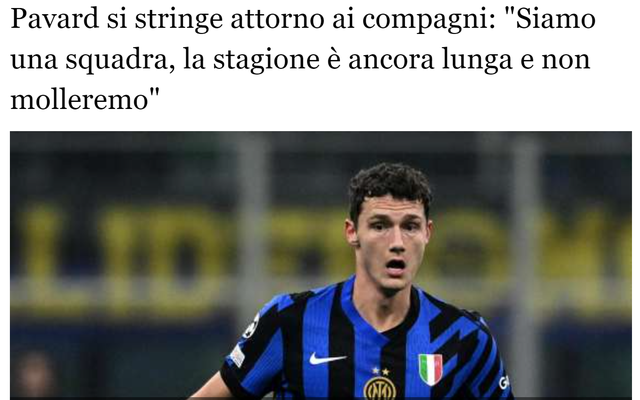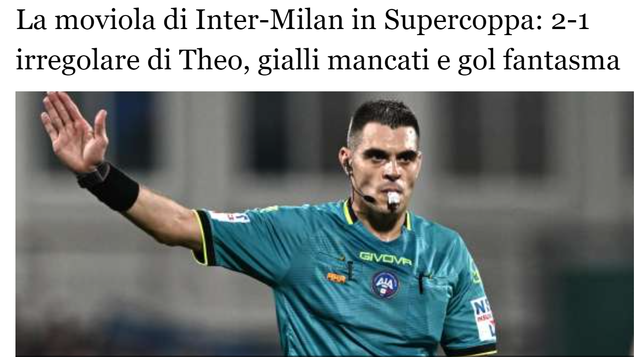Football is a sport filled with passion. Assessments made in the heat of the moment are often unreliable.
Take, for example, Zlatan Ibrahimovic, the manager of AC Milan.
Ten days ago, when Fonseca's sacking drama unfolded, nine and a half out of ten Rossoneri supporters were cursing Ibrahimovic, finding him utterly inadequate. But after winning the Super Cup, when Ibrahimovic confidently repeated his mantra "I'm the best after God" in the locker room, a large number of people began to praise him as a managerial genius.

Interestingly, those who gave two completely different evaluations within ten days are often the same group of people.
But in the football world, who can always win? Who hasn't lost a game?
Even a powerhouse like Manchester City, the reigning champions of the Premier League with four consecutive titles, had a five-game losing streak just a few hundred days ago. And Real Madrid, champions of La Liga and the Champions League just months ago, suffered humiliating defeats against Barcelona and AC Milan in November - at that time, Catalan media were raving about Flick's miraculous arrival and their certainty of winning the title. But now? Real Madrid has climbed back to the top of La Liga, leading Barcelona by five points.

All this reveals the most basic truth on the field: Do not judge a hero by a single victory or defeat!
After Inter Milan lost the Super Cup, many fans were disheartened, saying that the Nerazzurri's period of prosperity was over.
But in my personal view, one match - especially a loss after five consecutive victories due to a last-minute goal - is not enough to make such a judgment.

To some extent, observing a team's reaction after a loss often reveals more about its character, atmosphere, strength, and wisdom. After Inter Milan lost the Super Cup, there were four positive signals worth noting.
Signal One: The Captain and Vice-Captain's Motivation.
After the game, Inter Milan's captain Lautaro and vice-captain Barella delivered sincere speeches in the locker room, reaching a consensus with all players: The team takes pride in not achieving a four-peat, but will not waver in its trust in the system, the team, and the coach. The best way to avenge this loss is to approach the upcoming Serie A and Champions League matches with a more upright attitude.

One detail is that when Inter Milan players came down from the podium, they were generally in low spirits, but Lautaro stood there, offering encouragement to everyone.
Currently, there are many voices criticizing Lautaro for his high salary.
But let's keep things separate; as a captain and leader, Lautaro's sense of responsibility and dedication shown at this moment deserves praise. In times of defeat, this is what a captain should do.

Signal Two: The Professionalism of Inter Milan's Coaching Staff and Uniform Group.
On the morning of January 7th, Beijing time, Inter Milan concluded their Super Cup match at the King Fahd International Stadium in Riyadh. Within less than half a day, Inter Milan returned to Milan to prepare for the Serie A match against Venezia over the weekend. Keep in mind that the flight alone is 6-7 hours long!
Italian media revealed that due to requests from Inzaghi and the efforts of the uniform group, Inter Milan boarded the return flight immediately after leaving the Super Cup stadium.

This is the professionalism and efficiency expected of a team aiming to win multiple championships. It also reflects the correct attitude: In the football world, which match is the most important? Answer: The next one. Will Inter Milan lose their fighting spirit after losing the Super Cup? Answer: No.
Signal Three: Pauar's Statement.
Before the Italian Super Cup, Bisek performed outstandingly, sparking discussions in the capital's newspapers: If Pauar recovers from injury, who should be the main player between the Frenchman and the German? If the Frenchman becomes a substitute, wasn't it a foolish deal for Inter Milan to spend 32 million on an older substitute years ago?

In the final of the Italian Super Cup, Bisek made some mistakes, and the same media began to criticize Bisek again, believing that "If Pauar could have played, how could Leo and others have caused such chaos?"
That's the Italian media for you! They only care about setting the tone, never minding whether they get slapped in the face.
Some worry that Bisek's obvious rise might cause Pauar to fear losing his starting position, potentially affecting team unity. During the Italian Super Cup, Pauar stayed in Milan to recover from his injury, avoiding responsibility for the loss, so would he secretly rejoice watching his competitor mess up?

In fact, after the loss, Pauar used social media to state: We are a team, we share the wins and losses. The season is long, we won't give up!
In Serie A, when facing defeat, some people are accustomed to shifting blame. But there are also those who "take the blame," and that's commendable!
Signal Four: Inter Milan Won't Argue with the Referees.

I agree with Old Wei's opinion: In the Italian Super Cup final, the referee's biased decisions at crucial moments directly influenced the outcome.
In an era where videos can record everything, what the referees do cannot be washed away with a few words. Most TV stations and video providers have criticized them.
Many Italian media outlets believe that if Inter Milan fiercely criticizes the coaches after the game, the referees on duty, such as Simone Soares, may face consequences. At the very least, they could learn from Conte, crying more wrongfully than Dou E, with the main purpose of pressuring the referees, hoping that the Football Association might feel guilty and "find balance" in the next game!
However, according to Biyasini's understanding: From the chairman and managers to the coaches and players of Inter Milan, none of them intend to argue with the referees, preferring instead to look for shortcomings within themselves.
This is also a good attitude, or rather, a signal that the confidence and self-esteem of the strong have not truly been shaken.
In summary, after the loss, Inter Milan displayed a series of positive signals post-game, proving that the view that a cup match defeat would lead Inter Milan to a "doomsday" is hasty.